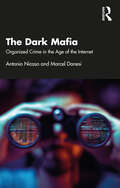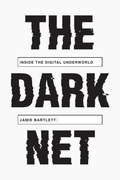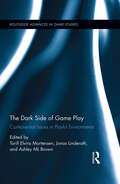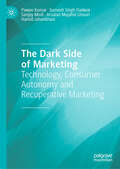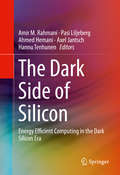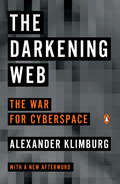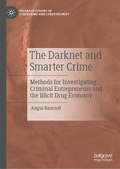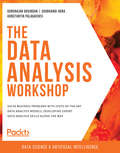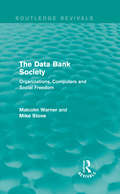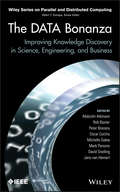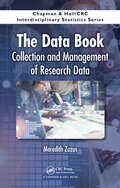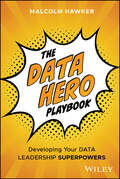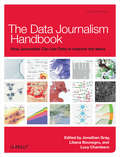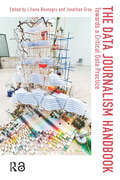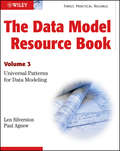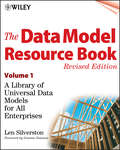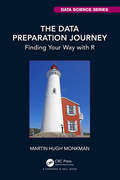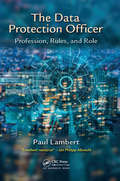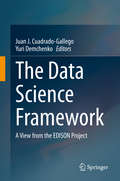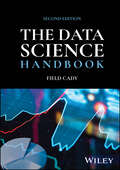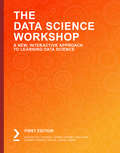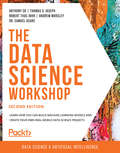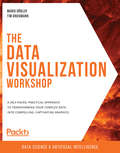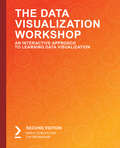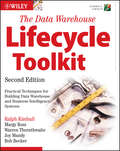- Table View
- List View
The Dark Mafia: Organized Crime in the Age of the Internet
by Marcel Danesi Antonio NicasoThis book explores how organized crime has adapted and evolved in sync with ever-expanding technologies to update its popular image and to conduct its covert operations. It shows how organized crime operates in dark virtual spaces and how it can now form a dynamic interactive system with legitimate online spaces, solidifying its criminal exploits and resources, and making them attractive to a new generation of computer users. Focusing on Italian Mafias, Russian and Georgian criminal groups and drug cartels, and Asian crime syndicates such as Yakuza and Triads, this book aims to describe and explain the reasons behind the continuity of online and offline crime, taking into consideration whether or not internet culture has radically changed the way we perceive organized crime and if so how, and thus how the shift in popular imagery that the internet has brought about affects its actual illegal activities. We also consider how organized crime has shifted its locale from the physical to the virtual, how cybercrime has allowed criminal organizations to adapt and reinvent themselves, and how the police now use technology against organized crime. To better understand the new generation of criminals, it is becoming increasingly urgent to understand the latest technologies and how criminals utilize them. The Dark Mafia is an engaging and accessible introduction to understanding virtual organized crime. It will appeal to students and scholars of criminology, sociology, policing, and all those interested in the digital age of organized crime.
The Dark Net
by Jamie BartlettAn Independent and New Statesman Book of the YearBeyond the familiar online world that most of us inhabit--a world of Google, Facebook, and Twitter--lies a vast and often hidden network of sites, communities, and cultures where freedom is pushed to its limits, and where people can be anyone, or do anything, they want. This is the world of Bitcoin and Silk Road, of radicalism and pornography. This is the Dark Net.In this important and revealing book, Jamie Bartlett takes us deep into the digital underworld and presents an extraordinary look at the internet we don't know. Beginning with the rise of the internet and the conflicts and battles that defined its early years, Bartlett reports on trolls, pornographers, drug dealers, hackers, political extremists, Bitcoin programmers, and vigilantes--and puts a human face on those who have many reasons to stay anonymous.Rich with historical research and revelatory reporting, The Dark Net is an unprecedented, eye-opening look at a world that doesn't want to be known.m the Hardcover edition.
The Dark Side of Game Play: Controversial Issues in Playful Environments (Routledge Advances in Game Studies)
by Torill Elvira Mortensen Jonas Linderoth Ashley Ml BrownGames allow players to experiment and play with subject positions, values and moral choice. In game worlds players can take on the role of antagonists; they allow us to play with behaviour that would be offensive, illegal or immoral if it happened outside of the game sphere. While contemporary games have always handled certain problematic topics, such as war, disasters, human decay, post-apocalyptic futures, cruelty and betrayal, lately even the most playful of genres are introducing situations in which players are presented with difficult ethical and moral dilemmas. This volume is an investigation of "dark play" in video games, or game play with controversial themes as well as controversial play behaviour. It covers such questions as: Why do some games stir up political controversies? How do games invite, or even push players towards dark play through their design? Where are the boundaries for what can be presented in a games? Are these boundaries different from other media such as film and books, and if so why? What is the allure of dark play and why do players engage in these practices?
The Dark Side of Marketing: Technology, Consumer Autonomy and Recuperative Marketing
by Pawan Kumar Hamid Jahankhani Sumesh Singh Dadwal Sanjay Modi Arsalan Mujahid GhouriThis book offers a profound exploration into how technology-enabled marketing strategies often undermine personal freedom, undertake unethical, non-permissible marketing and manipulate consumer behaviour. It looks at what remedial actions can be taken to have sustainable, ethical and recuperative marketing. Taking an interdisciplinary approach, this book delves into the history, psychology, theories, and models of modern marketing practices, revealing the often hidden, coercive strategies that erode individual autonomy, and will provide guidance for new models for suitable and recuperative marketing. The authors draw on extensive research and real-world examples from advanced and developing countries and critically examine the technological, legal and ethical implications of these marketing practices. It proposes pathways to more respectful, empowering, democratic, sustainable, and recuperative marketing models and approaches.
The Dark Side of Silicon
by Axel Jantsch Amir M. Rahmani Pasi Liljeberg Ahmed Hemani Hannu TenhunenThis book presents the state-of-the art of one of the main concerns with microprocessors today, a phenomenon known as "dark silicon". Readers will learn how power constraints (both leakage and dynamic power) limit the extent to which large portions of a chip can be powered up at a given time, i. e. how much actual performance and functionality the microprocessor can provide. The authors describe their research toward the future of microprocessor development in the dark silicon era, covering a variety of important aspects of dark silicon-aware architectures including design, management, reliability, and test. Readers will benefit from specific recommendations for mitigating the dark silicon phenomenon, including energy-efficient, dedicated solutions and technologies to maximize the utilization and reliability of microprocessors.
The Darkening Web: The War for Cyberspace
by Alexander Klimburg"A chilling but well-informed and readable tour of cyber interdependence. Anyone interested in our growing global vulnerabilities should read this book.”—Joseph S. Nye, Jr., author of The Future of PowerNo single invention of the last half century has changed the way we live now as much as the Internet. Alexander Klimburg was a member of the generation for whom it was a utopian ideal turned reality: a place where ideas, information, and knowledge could be shared and new freedoms found and enjoyed. Two decades later, the future isn’t so bright any more: increasingly, the Internet is used as a weapon and a means of domination by states eager to exploit or curtail global connectivity in order to further their national interests. Klimburg is a leading voice in the conversation on the implications of this dangerous shift, and in The Darkening Web, he explains why we underestimate the consequences of states’ ambitions to project power in cyberspace at our peril: Not only have hacking and cyber operations fundamentally changed the nature of political conflict—ensnaring states in a struggle to maintain a precarious peace that could rapidly collapse into all-out war—but the rise of covert influencing and information warfare has enabled these same global powers to create and disseminate their own distorted versions of reality in which anything is possible. At stake are not only our personal data or the electrical grid, but the Internet as we know it today—and with it the very existence of open and democratic societies. Blending anecdote with argument, Klimburg brings us face-to-face with the range of threats the struggle for cyberspace presents, from an apocalyptic scenario of debilitated civilian infrastructure to a 1984-like erosion of privacy and freedom of expression. Focusing on different approaches to cyber-conflict in the US, Russia and China, he reveals the extent to which the battle for control of the Internet is as complex and perilous as the one surrounding nuclear weapons during the Cold War—and quite possibly as dangerous for humanity as a whole. Authoritative, thought-provoking, and compellingly argued, The Darkening Web makes clear that the debate about the different aspirations for cyberspace is nothing short of a war over our global values.
The Darknet and Smarter Crime: Methods for Investigating Criminal Entrepreneurs and the Illicit Drug Economy (Palgrave Studies in Cybercrime and Cybersecurity)
by Angus BancroftThis book draws on research into darknet cryptomarkets to examine themes of cybercrime, cybersecurity, illicit markets and drug use. Cybersecurity is increasingly seen as essential yet it is also a point of contention between citizens, states, non-governmental organisations and private corporations as each grapples with existing and developing technologies. The increased importance of privacy online has sparked concerns about the loss of confidentiality and autonomy in the face of state and corporate surveillance on one hand, and the creation of ungovernable spaces and the facilitation of terrorism and harassment on the other. These differences and disputes highlight the dual nature of the internet: allowing counter-publics to emerge and providing opportunities for state and corporate domination through control of the data infrastructure. The Darknet and Smarter Crime argues that, far from being a dangerous anarchist haven, the darknet and the technologies used within it could have benefits and significance for everyone online. This book engages with a number of debates about the internet and new communication technologies, including: surveillance and social control, anonymity and privacy, the uses and abuses of data encryption technologies and cyber-cultures and collective online identities
The Data Analysis Workshop: Solve business problems with state-of-the-art data analysis models, developing expert data analysis skills along the way
by Shubhangi Hora Gururajan Govindan Konstantin PalagachevLearn how to analyze data using Python models with the help of real-world use cases and guidance from industry experts Key Features Get to grips with data analysis by studying use cases from different fields Develop your critical thinking skills by following tried-and-true data analysis Learn how to use conclusions from data analyses to make better business decisions Book Description Businesses today operate online and generate data almost continuously. While not all data in its raw form may seem useful, if processed and analyzed correctly, it can provide you with valuable hidden insights. The Data Analysis Workshop will help you learn how to discover these hidden patterns in your data, to analyze them, and leverage the results to help transform your business. The book begins by taking you through the use case of a bike rental shop. You'll be shown how to correlate data, plot histograms, and analyze temporal features. As you progress, you'll learn how to plot data for a hydraulic system using the Seaborn and Matplotlib libraries, and explore a variety of use cases that show you how to join and merge databases, prepare data for analysis, and handle imbalanced data. By the end of the book, you'll have learned different data analysis techniques, including hypothesis testing, correlation, and null-value imputation, and will have become a confident data analyst. What you will learn Get to grips with the fundamental concepts and conventions of data analysis Understand how different algorithms help you to analyze the data effectively Determine the variation between groups of data using hypothesis testing Visualize your data correctly using appropriate plotting points Use correlation techniques to uncover the relationship between variables Find hidden patterns in data using advanced techniques and strategies Who this book is for The Data Analysis Workshop is for programmers who already know how to code in Python and want to use it to perform data analysis. If you are looking to gain practical experience in data science with Python, this book is for you.
The Data Bank Society: Organizations, Computers and Social Freedom (Routledge Revivals)
by Mike Stone Malcolm WarnerThis study, written in the context of its first publication in 1970, discusses and documents the invasion of privacy by the corporation and the social institution in the search for efficiency in information processing. Discussing areas such as the impact of the computer on administration, privacy and the storage on information, the authors assess the technical and social feasibility of constructing integrated data banks to cover the details of populations. The book was hugely influential both in terms of scholarship and legislation, and the years following saw the introduction of the Data Protection Act of 1984, which was then consolidated by the Act of 1998. The topics under discussion remain of great concern to the public in our increasingly web-based world, ensuring the continued relevance of this title to academics and students with an interest in data protection and public privacy.
The Data Bonanza: Improving Knowledge Discovery in Science, Engineering, and Business (Wiley Series on Parallel and Distributed Computing #90)
by Mark Parsons Malcolm Atkinson Rob Baxter David Snelling Peter Brezany Jano Van Hemert Oscar Corcho Michelle GaleaComplete guidance for mastering the tools and techniques of the digital revolution With the digital revolution opening up tremendous opportunities in many fields, there is a growing need for skilled professionals who can develop data-intensive systems and extract information and knowledge from them. This book frames for the first time a new systematic approach for tackling the challenges of data-intensive computing, providing decision makers and technical experts alike with practical tools for dealing with our exploding data collections. Emphasizing data-intensive thinking and interdisciplinary collaboration, The Data Bonanza: Improving Knowledge Discovery in Science, Engineering, and Business examines the essential components of knowledge discovery, surveys many of the current research efforts worldwide, and points to new areas for innovation. Complete with a wealth of examples and DISPEL-based methods demonstrating how to gain more from data in real-world systems, the book: Outlines the concepts and rationale for implementing data-intensive computing in organizations Covers from the ground up problem-solving strategies for data analysis in a data-rich world Introduces techniques for data-intensive engineering using the Data-Intensive Systems Process Engineering Language DISPEL Features in-depth case studies in customer relations, environmental hazards, seismology, and more Showcases successful applications in areas ranging from astronomy and the humanities to transport engineering Includes sample program snippets throughout the text as well as additional materials on a companion website The Data Bonanza is a must-have guide for information strategists, data analysts, and engineers in business, research, and government, and for anyone wishing to be on the cutting edge of data mining, machine learning, databases, distributed systems, or large-scale computing.
The Data Book: Collection and Management of Research Data (Chapman & Hall/CRC Interdisciplinary Statistics)
by Meredith ZozusThe Data Book: Collection and Management of Research Data is the first practical book written for researchers and research team members covering how to collect and manage data for research. The book covers basic types of data and fundamentals of how data grow, move and change over time. Focusing on pre-publication data collection and handling, the text illustrates use of these key concepts to match data collection and management methods to a particular study, in essence, making good decisions about data. The first section of the book defines data, introduces fundamental types of data that bear on methodology to collect and manage them, and covers data management planning and research reproducibility. The second section covers basic principles of and options for data collection and processing emphasizing error resistance and traceability. The third section focuses on managing the data collection and processing stages of research such that quality is consistent and ultimately capable of supporting conclusions drawn from data. The final section of the book covers principles of data security, sharing, and archival. This book will help graduate students and researchers systematically identify and implement appropriate data collection and handling methods.
The Data Hero Playbook: Developing Your Data Leadership Superpowers
by Malcolm HawkerA powerful new mindset for data leaders in any organization In The Data Hero Playbook: Developing Your Data Leadership Superpowers, veteran data professional and thought leader Malcolm Hawker offers fresh and exciting new ways to collect, manage, and use data. Called “Heroic Data Leadership,” Hawker's new mindset for data professionals will unlock the true potential of your organization's data. It puts to bed the limiting, counterproductive mindsets that often plague data leaders and offers original and effective alternatives you can apply immediately to generate tangible business results. The book shows you how to re-center customer satisfaction within your data strategy and convincingly demonstrates why sound data management must be paired with the delivery of value to the customer in order to have a significant impact on your company's bottom line. Inside the book: Step-by-step recommendations for productive behaviors and best practices within your data teams Illuminating quotes and anecdotes from data professionals leading data functions at large companies today Narratives and stories explaining how to transition from stale, limiting data mindsets to more productive and effective approaches An essential resource for data professionals at organizations of all types and sizes, The Data Hero Playbook is the hands-on roadmap to data leadership that managers, analysts, executives, entrepreneurs, and founders have been waiting for.
The Data Journalism Handbook: How Journalists Can Use Data to Improve the News
by Jonathan Gray Lucy Chambers Liliana BounegruWhen you combine the sheer scale and range of digital information now available with a journalist’s "nose for news" and her ability to tell a compelling story, a new world of possibility opens up. With The Data Journalism Handbook, you’ll explore the potential, limits, and applied uses of this new and fascinating field.This valuable handbook has attracted scores of contributors since the European Journalism Centre and the Open Knowledge Foundation launched the project at MozFest 2011. Through a collection of tips and techniques from leading journalists, professors, software developers, and data analysts, you’ll learn how data can be either the source of data journalism or a tool with which the story is told—or both.Examine the use of data journalism at the BBC, the Chicago Tribune, the Guardian, and other news organizationsExplore in-depth case studies on elections, riots, school performance, and corruptionLearn how to find data from the Web, through freedom of information laws, and by "crowd sourcing"Extract information from raw data with tips for working with numbers and statistics and using data visualizationDeliver data through infographics, news apps, open data platforms, and download links
The Data Journalism Handbook: Towards A Critical Data Practice (Digital Studies)
by Liliana Bounegru Jonathan GrayThe Data Journalism Handbook: Towards a Critical Data Practice provides a rich and panoramic introduction to data journalism, combining both critical reflection and practical insight. It offers a diverse collection of perspectives on how data journalism is done around the world and the broader consequences of datafication in the news, serving as both a textbook and a sourcebook for this emerging field. With more than 50 chapters from leading researchers and practitioners of data journalism, it explores the work needed to render technologies and data productive for journalistic purposes. It also gives a behind the scenes look at the social lives of data sets, data infrastructures, and data stories in newsrooms, media organizations, start-ups, civil society organizations and beyond. The book includes sections on doing issues with data, assembling data, working with data, experiencing data, investigating data, platforms and algorithms, organizing data journalism, learning data journalism together and situating data journalism.
The Data Model Resource Book
by Len Silverston Paul AgnewThis third volume of the best-selling "Data Model Resource Book" series revolutionizes the data modeling discipline by answering the question "How can you save significant time while improving the quality of any type of data modeling effort?" In contrast to the first two volumes, this new volume focuses on the fundamental, underlying patterns that affect over 50 percent of most data modeling efforts. These patterns can be used to considerably reduce modeling time and cost, to jump-start data modeling efforts, as standards and guidelines to increase data model consistency and quality, and as an objective source against which an enterprise can evaluate data models.
The Data Model Resource Book
by Len SilverstonA quick and reliable way to build proven databases for core business functions Industry experts raved about The Data Model Resource Book when it was first published in March 1997 because it provided a simple, cost-effective way to design databases for core business functions. Len Silverston has now revised and updated the hugely successful First Edition, while adding a companion volume to take care of more specific requirements of different businesses. Each volume is accompanied by a CD-ROM, which is sold separately. Each CD-ROM provides powerful design templates discussed in the books in a ready-to-use electronic format, allowing companies and individuals to develop the databases they need at a fraction of the cost and a third of the time it would take to build them from scratch. Updating the data models from the First Edition CD-ROM, this resource allows database developers to quickly load a core set of data models and customize them to support a wide range of business functions.
The Data Preparation Journey: Finding Your Way with R (Chapman & Hall/CRC Data Science Series)
by Martin Hugh MonkmanThe Data Preparation Journey: Finding Your Way With R introduces the principles of data preparation within in a systematic approach that follows a typical data science or statistical workflow. With that context, readers will work through practical solutions to resolving problems in data using the statistical and data science programming language R. These solutions include examples of complex real-world data, adding greater context and exposing the reader to greater technical challenges. This book focuses on the Import to Tidy to Transform steps. It demonstrates how “Visualise” is an important part of Exploratory Data Analysis, a strategy for identifying potential problems with the data prior to cleaning.This book is designed for readers with a working knowledge of data manipulation functions in R or other programming languages. It is suitable for academics for whom analyzing data is crucial, businesses who make decisions based on the insights gleaned from collecting data from customer interactions, and public servants who use data to inform policy and program decisions. The principles and practices described within The Data Preparation Journey apply regardless of the context.Key Features: Includes R package containing the code and data sets used in the book Comprehensive examples of data preparation from a variety of disciplines Defines the key principles of data preparation, from access to publication
The Data Protection Officer: Profession, Rules, and Role
by Paul LambertThe EU's General Data Protection Regulation created the position of corporate Data Protection Officer (DPO), who is empowered to ensure the organization is compliant with all aspects of the new data protection regime. Organizations must now appoint and designate a DPO. The specific definitions and building blocks of the data protection regime are enhanced by the new General Data Protection Regulation and therefore the DPO will be very active in passing the message and requirements of the new data protection regime throughout the organization. This book explains the roles and responsiblies of the DPO, as well as highlights the potential cost of getting data protection wrong.
The Data Science Framework: A View from the EDISON Project
by Juan J. Cuadrado-Gallego Yuri DemchenkoThis edited book first consolidates the results of the EU-funded EDISON project (Education for Data Intensive Science to Open New science frontiers), which developed training material and information to assist educators, trainers, employers, and research infrastructure managers in identifying, recruiting and inspiring the data science professionals of the future. It then deepens the presentation of the information and knowledge gained to allow for easier assimilation by the reader.The contributed chapters are presented in sequence, each chapter picking up from the end point of the previous one. After the initial book and project overview, the chapters present the relevant data science competencies and body of knowledge, the model curriculum required to teach the required foundations, profiles of professionals in this domain, and use cases and applications. The text is supported with appendices on related process models.The book can be used to develop new courses in data science, evaluate existing modules and courses, draft job descriptions, and plan and design efficient data-intensive research teams across scientific disciplines.
The Data Science Handbook
by Field CadyPractical, accessible guide to becoming a data scientist, updated to include the latest advances in data science and related fields. Becoming a data scientist is hard. The job focuses on mathematical tools, but also demands fluency with software engineering, understanding of a business situation, and deep understanding of the data itself. This book provides a crash course in data science, combining all the necessary skills into a unified discipline. The focus of The Data Science Handbook is on practical applications and the ability to solve real problems, rather than theoretical formalisms that are rarely needed in practice. Among its key points are: An emphasis on software engineering and coding skills, which play a significant role in most real data science problems.Extensive sample code, detailed discussions of important libraries, and a solid grounding in core concepts from computer science (computer architecture, runtime complexity, and programming paradigms).A broad overview of important mathematical tools, including classical techniques in statistics, stochastic modeling, regression, numerical optimization, and more.Extensive tips about the practical realities of working as a data scientist, including understanding related jobs functions, project life cycles, and the varying roles of data science in an organization.Exactly the right amount of theory. A solid conceptual foundation is required for fitting the right model to a business problem, understanding a tool’s limitations, and reasoning about discoveries. Data science is a quickly evolving field, and this 2nd edition has been updated to reflect the latest developments, including the revolution in AI that has come from Large Language Models and the growth of ML Engineering as its own discipline. Much of data science has become a skillset that anybody can have, making this book not only for aspiring data scientists, but also for professionals in other fields who want to use analytics as a force multiplier in their organization.
The Data Science Workshop: A New, Interactive Approach to Learning Data Science
by Anthony So Thomas V. Joseph Robert Thas John Andrew Worsley Dr. Samuel AsareCut through the noise and get real results with a step-by-step approach to data science Key Features Ideal for the data science beginner who is getting started for the first time A data science tutorial with step-by-step exercises and activities that help build key skills Structured to let you progress at your own pace, on your own terms Use your physical print copy to redeem free access to the online interactive edition Book Description You already know you want to learn data science, and a smarter way to learn data science is to learn by doing. The Data Science Workshop focuses on building up your practical skills so that you can understand how to develop simple machine learning models in Python or even build an advanced model for detecting potential bank frauds with effective modern data science. You'll learn from real examples that lead to real results. Throughout The Data Science Workshop, you'll take an engaging step-by-step approach to understanding data science. You won't have to sit through any unnecessary theory. If you're short on time you can jump into a single exercise each day or spend an entire weekend training a model using sci-kit learn. It's your choice. Learning on your terms, you'll build up and reinforce key skills in a way that feels rewarding. Every physical print copy of The Data Science Workshop unlocks access to the interactive edition. With videos detailing all exercises and activities, you'll always have a guided solution. You can also benchmark yourself against assessments, track progress, and receive content updates. You'll even earn a secure credential that you can share and verify online upon completion. It's a premium learning experience that's included with your printed copy. To redeem, follow the instructions located at the start of your data science book. Fast-paced and direct, The Data Science Workshop is the ideal companion for data science beginners. You'll learn about machine learning algorithms like a data scientist, learning along the way. This process means that you'll find that your new skills stick, embedded as best practice. A solid foundation for the years ahead. What you will learn Find out the key differences between supervised and unsupervised learning Manipulate and analyze data using scikit-learn and pandas libraries Learn about different algorithms such as regression, classification, and clustering Discover advanced techniques to improve model ensembling and accuracy Speed up the process of creating new features with automated feature tool Simplify machine learning using open source Python packages Who this book is for Our goal at Packt is to help you be successful, in whatever it is you choose to do. The Data Science Workshop is an ideal data science tutorial for the data science beginner who is just getting started. Pick up a Workshop today and let Packt help you develop skills that stick with you for life.
The Data Science Workshop: Learn how you can build machine learning models and create your own real-world data science projects, 2nd Edition
by Anthony So Thomas V. Joseph Robert Thas John Andrew Worsley Dr. Samuel AsareGain expert guidance on how to successfully develop machine learning models in Python and build your own unique data platforms Key Features Gain a full understanding of the model production and deployment process Build your first machine learning model in just five minutes and get a hands-on machine learning experience Understand how to deal with common challenges in data science projects Book Description Where there's data, there's insight. With so much data being generated, there is immense scope to extract meaningful information that'll boost business productivity and profitability. By learning to convert raw data into game-changing insights, you'll open new career paths and opportunities. The Data Science Workshop begins by introducing different types of projects and showing you how to incorporate machine learning algorithms in them. You'll learn to select a relevant metric and even assess the performance of your model. To tune the hyperparameters of an algorithm and improve its accuracy, you'll get hands-on with approaches such as grid search and random search. Next, you'll learn dimensionality reduction techniques to easily handle many variables at once, before exploring how to use model ensembling techniques and create new features to enhance model performance. In a bid to help you automatically create new features that improve your model, the book demonstrates how to use the automated feature engineering tool. You'll also understand how to use the orchestration and scheduling workflow to deploy machine learning models in batch. By the end of this book, you'll have the skills to start working on data science projects confidently. By the end of this book, you'll have the skills to start working on data science projects confidently. What you will learn Explore the key differences between supervised learning and unsupervised learning Manipulate and analyze data using scikit-learn and pandas libraries Understand key concepts such as regression, classification, and clustering Discover advanced techniques to improve the accuracy of your model Understand how to speed up the process of adding new features Simplify your machine learning workflow for production Who this book is for This is one of the most useful data science books for aspiring data analysts, data scientists, database engineers, and business analysts. It is aimed at those who want to kick-start their careers in data science by quickly learning data science techniques without going through all the mathematics behind machine learning algorithms. Basic knowledge of the Python programming language will help you easily grasp the concepts explained in this book.
The Data Visualization Workshop: A self-paced, practical approach to transforming your complex data into compelling, captivating graphics
by Tim Großmann Mario DoblerExplore a modern approach to visualizing data with Python and transform large real-world datasets into expressive visual graphics using this beginner-friendly workshop Key Features Discover the essential tools and methods of data visualization Learn to use standard Python plotting libraries such as Matplotlib and Seaborn Gain insights into the visualization techniques of big companies Book Description Do you want to transform data into captivating images? Do you want to make it easy for your audience to process and understand the patterns, trends, and relationships hidden within your data? The Data Visualization Workshop will guide you through the world of data visualization and help you to unlock simple secrets for transforming data into meaningful visuals with the help of exciting exercises and activities. Starting with an introduction to data visualization, this book shows you how to first prepare raw data for visualization using NumPy and pandas operations. As you progress, you'll use plotting techniques, such as comparison and distribution, to identify relationships and similarities between datasets. You'll then work through practical exercises to simplify the process of creating visualizations using Python plotting libraries such as Matplotlib and Seaborn. If you've ever wondered how popular companies like Uber and Airbnb use geoplotlib for geographical visualizations, this book has got you covered, helping you analyze and understand the process effectively. Finally, you'll use the Bokeh library to create dynamic visualizations that can be integrated into any web page. By the end of this workshop, you'll have learned how to present engaging mission-critical insights by creating impactful visualizations with real-world data. What you will learn Understand the importance of data visualization in data science Implement NumPy and pandas operations on real-life datasets Create captivating data visualizations using plotting libraries Use advanced techniques to plot geospatial data on a map Integrate interactive visualizations to a webpage Visualize stock prices with Bokeh and analyze Airbnb data with Matplotlib Who this book is for The Data Visualization Workshop is for beginners who want to learn data visualization, as well as developers and data scientists who are looking to enrich their practical data science skills. Prior knowledge of data analytics, data science, and visualization is not mandatory. Knowledge of Python basics and high-school-level math will help you grasp the concepts covered in this data visualization book more quickly and effectively.
The Data Visualization Workshop: An Interactive Approach to Learning Data Visualization, 2nd Edition
by Tim Großmann Mario DoblerCut through the noise and get real results with a step-by-step approach to learning data visualization with Python Key Features Ideal for Python beginners getting started with data visualization for the first time A step-by-step data visualization tutorial with exercises and activities that help build key skills Structured to let you progress at your own pace, on your own terms Use your physical print copy to redeem free access to the online interactive edition Book Description You already know you want to learn data visualization with Python, and a smarter way to learn is to learn by doing. The Data Visualization Workshop focuses on building up your practical skills so that you can develop clear, expressive real-world charts and diagrams. You'll learn from real examples that lead to real results. Throughout The Data Visualization Workshop, you'll take an engaging step-by-step approach to understand data visualization with Python. You won't have to sit through any unnecessary theory. If you're short on time you can jump into a single exercise each day or spend an entire weekend learning how companies like Uber are using advanced visualization techniques to represent their data visually. It's your choice. Learning on your terms, you'll build up and reinforce key skills in a way that feels rewarding. Every physical print copy of The Data Visualization Workshop unlocks access to the interactive edition. With videos detailing all exercises and activities, you'll always have a guided solution. You can also benchmark yourself against assessments, track progress, and receive content updates. You'll even earn a secure credential that you can share and verify online upon completion. It's a premium learning experience that's included with your printed copy. To redeem, follow the instructions located at the start of your book. Fast-paced and direct, The Data Visualization Workshop is the ideal companion for Python beginners who want to get up and running with data visualization. You'll visualize your work like a skilled data scientist, learning along the way. This process means that you'll find that your new skills stick, embedded as best practice. A solid foundation for the years ahead. What you will learn Get to grips with fundamental concepts and conventions of data visualization Learn how to use libraries like NumPy and Pandas to index, slice, and iterate data frames Implement different plotting techniques to produce compelling data visualizations Learn how you can skyrocket your Python data wrangling skills Draw statistical graphics using the Seaborn and Matplotlib libraries Create interactive visualizations and integrate them into any web page Who this book is for Our goal at Packt is to help you be successful, in whatever it is that you choose to do. The Data Visualization Workshop is an ideal tutorial for those who want to perform data visualization with Python and are just getting started. Pick up a Workshop today and let Packt help you develop skills that stick with you for life.
The Data Warehouse Lifecycle Toolkit
by Joy Mundy Bob Becker Margy Ross Ralph Kimball Warren ThornthwaiteA thorough update to the industry standard for designing, developing, and deploying data warehouse and business intelligence systemsThe world of data warehousing has changed remarkably since the first edition of The Data Warehouse Lifecycle Toolkit was published in 1998. In that time, the data warehouse industry has reached full maturity and acceptance, hardware and software have made staggering advances, and the techniques promoted in the premiere edition of this book have been adopted by nearly all data warehouse vendors and practitioners. In addition, the term "business intelligence" emerged to reflect the mission of the data warehouse: wrangling the data out of source systems, cleaning it, and delivering it to add value to the business.Ralph Kimball and his colleagues have refined the original set of Lifecycle methods and techniques based on their consulting and training experience. The authors understand first-hand that a data warehousing/business intelligence (DW/BI) system needs to change as fast as its surrounding organization evolves. To that end, they walk you through the detailed steps of designing, developing, and deploying a DW/BI system. You'll learn to create adaptable systems that deliver data and analyses to business users so they can make better business decisions.
